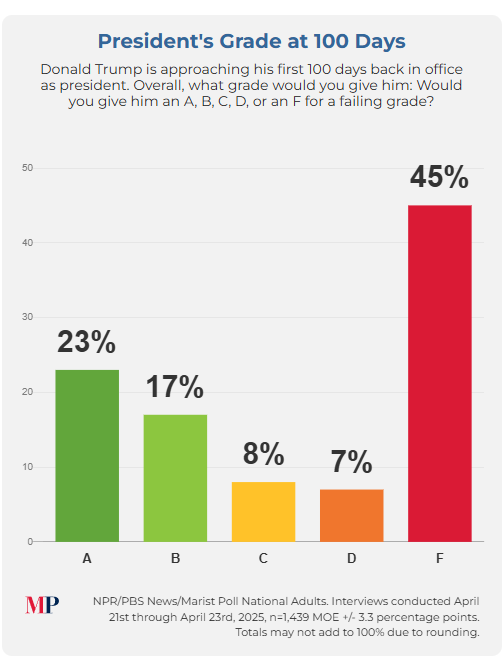“William Henry Harrison had a better first 100 days, and he spent 70 of them dead.” — Somebody on social media.
We’re being inundated with punditry, analysis, and jeremiads about Trump’s first 100 days. But the summaries of 2.0 will hardly be able to capture the manic velocity and chaos of that splenetic shitshow — 100 days fueled by spite, hubris, ketamine, and that sweet, sweet aphrodisiac of autocracy.
Paradoxically, Trump’s shock and awe was both focused and anarchic. He filled his administration with misfits, cranks, toadies, and chodes from the fever swamp. (Tulsi Gabbard? Kash Patel? Pete Hegseth? Dan Bongino??? Robert Fuqqing Kennedy Jr.??? Kristi Noem? Matt Gaetz???? Pam Bondi?)
He empowered the world’s richest man and most prolific sperm-donor, Elon Musk, to take a chainsaw to the federal government, and launched a bitter campaign of retribution against his enemies.
He met with bigoted conspiracist and professional lunatic Laura Loomer in the Oval Office and then fired national security officials at her behest.
Looking back now, it feels like a blur: the blanket pardons for the J6 rioters and seditionists; the abandonment of Ukraine and NATO; the flagrant corruption; the lust for Greenland-Canada-Gaza-Panama; the massive and chaotic firings and aid cuts; the anti-science quackery; the weaponization of the DOJ and FCC; the purge of the military; the attacks on universities, law firms, and the media; the lawless deportations; the defiance of the Supreme Court; and, of course, a pointless and destructive trade war that threatens to tank the economy.
But anyone who was truly shocked, clearly had not been paying attention or was indulging in a comfortable delusion of normalcy. Trump told us over and over who he was and what he intended to do. MAGA wrote it down.
And we were warned, weren’t we?
So, the biggest story of the first hundred days was not Donald Trump’s aggressive campaign of revenge and chaos, it was the rolling surrenders — the bending of the knee by the oligarchs, Big Law Firms, universities, and corporate media, who took their respective places beside Lindsey Graham in the Invertebrate Hall of Fame. Their capitulation emboldened Trump to expand his assault on the rule of law, freedom of the press, and his ideological enemies.
I’m not naive about the threat we faced, but it was still appalling to realize how fragile it all was. The guardrails turned out to be paper thin. The “norms” were dust in the wind.
To be sure, there are hopeful signs. Resistance is forming and Trump’s illusion of invulnerability is cracking. But after the last 100 days, we are still left with the question: Did we bend — or did we break?
Honestly, it’s too early to tell.
A reminder that we can’t do this without you.
To the Contrary is a reader-supported publication. There are no investors. No sugar daddies. We’re not affiliated with any PACS. Or parties. Just me. And the dogs.
To receive new posts — including cross-posts, podcasts and videos— please consider becoming a free or paid subscriber. (And I’m immensely grateful for your generous support.)
Disorientation
Ryan Lizza recounts what a friend who had served in Iraq told him about the psychological disorientation of combat. “It’s so horrific, so unlike any human experience, that the initial instinct is to deny that what’s happening is actually happening.”
But, writes, Lizza, “That’s the psychology that has seized many newsrooms, law firms, and other elite institutions in Washington for months.”
You can listen to our discussion on today’s “To the Contrary” Podcast. [The video will be posted later today.]
Trump’s report card
Twice as many people said President Trump deserves a grade of F rather than an A for how he’s handled his first 100 days in office, according to a new NPR/PBS News/Marist poll.
Some key findings:
Plurality Disapproves of Administration's Handling of Abrego Garcia's Deportation
49% of Americans say, from what they have read or heard, they disapprove of the Trump Administration's handling of the deportation to El Salvador of Kilmar Abrego Garcia. 35% approve, and 15% are unsure.
More Than Six in Ten Say Trump is Moving Too Quickly
Many Americans (61%) think President Trump has been rushing to make changes without considering the impact of those actions. This is up from 56% in March.
Nearly Half of Americans Say Trump's Policies Have Negatively Impacted Them
49% of residents nationally report that the policies President Trump has implemented during his second term have had a mostly negative impact on them. . A majority of independents (52%) say President Trump's policies have mostly negatively affected them.
Six in Ten Say Nation's Economic Conditions are a Result of Trump's Policies
60% of Americans say they nation's current economic conditions are mostly a result of President Trump's own policies. 39% think they are mostly something President Trump inherited.
Majority of Americans Think Imposing Tariffs Hurts the U.S. Economy
57% of residents nationally, including 88% of Democrats, 22% of Republicans, and 58% of independents, think placing tariffs on imports from other countries hurts the U.S. economy. 33%, including 65% of Republicans, say tariffs help the national economy. One in ten (10%) say tariffs don't make much of a difference either way.
Most Americans Think the President Should Obey Federal Court Rulings
85% of Americans strongly agree or agree that the president should obey federal court rulings even if he does not like the rulings. 15% disagree or strongly disagree that the president should abide by these rulings. Regardless of party, most Americans either strongly agree or agree that the president should obey federal court rulings, despite how he feels about the rulings. However, most Democrats (73%) strongly agree with this position while 27% of Republicans say the same.
BONUS: Trump singlehandedly tanked the Conservatives…. in Canada. So much winning.
Meanwhile…. US consumer confidence plunges to lowest in 5 years on tariff worries | AP News
And… when you lose Ruper Murdoch…. Wall Street Journal Editorial: At 100 Days, Trump 2.0 Is in Trouble - WSJ
The main cause for alarm is his one-sided pursuit of peace in Ukraine. Until this weekend he had said scarcely a discouraging word about Vladimir Putin while squeezing Ukraine to make concessions that could doom it to future marauding. Much will hang on the details of an armistice, if there is one, and not merely for Europe’s future.
Joe Biden’s retreat from Afghanistan destroyed American deterrence. A debacle in Ukraine would do the same for Mr. Trump, with ramifications for Iran, North Korea and especially Chinese ambitions in the Pacific. Don’t be surprised if China decides to snatch Taiwan’s outer islands or tries a partial blockade. Mr. Trump told us in October that he’d respond to such a provocation with tariffs, but he’s already playing that card without success.
What happens next?
We need to hold two thoughts at the same time. (1) Trump is vulnerable, and the cracks are showing. (2) But that does not mean that he is not still dangerous. As bad as the last 100 days have been, the worst may be to come.
Olivia Troye: What Comes next: First, They Came for the Immigrants. Now, the Citizens.
The deportation of U.S. citizen children isn't the endpoint. It's the test run. Project 2025 is a 180-day plan to fundamentally restructure the system before effective opposition can mobilize. We're now 100 days in.
If the government can deport some citizens today, what prevents it from targeting political opponents tomorrow? What stops them from stripping dissenters of citizenship altogether?
This isn't improvisation or overreach by individual agents. It's a documented plan being methodically implemented. The Heritage Foundation's agenda explicitly calls for:
Mass deportations inside the U.S.
Criminalization of humanitarian aid groups.
Expansion of detention powers.
The gutting of long-standing asylum protections.
Imposition of political loyalty tests for immigrants.
…
The next phase will move even faster as the administration accelerates the implementation of its immigration and citizenship policies. The erosion of protections, expansion of detention authority, and acceleration of deportations are set to escalate.
Some Relevant Reads for the Era of Trump
Looking for some light summer reading? Or something to help you navigate the tides of our politics? Here’s a short reading list:
Tuesday dogs
Look at this one carefully. Auggie is looking straight at this deer… who is looking straight back. Peaceful coexistence.
**
Both boys on watch.












"“William Henry Harrison had a better first 100 days, and he spent 70 of them dead.” — Somebody on social media."
I know you're not in this to make my day, Charlie, but you did! And I'm still going to read the rest! Thank you!
You said it: the last hundred days weren’t just chaos—they were a controlled demolition, cheered on by the very people and institutions that once swore they’d stand guard.
Trump didn’t hide who he was. MAGA didn’t scribble its intentions in invisible ink. This wasn’t a con job. It was a declaration. And too many of the so-called gatekeepers responded the way a rabbit does to an oncoming lawnmower: they froze, they flattered, and they hoped someone else would take the hit first.
We watched it happen: corporations selling their brand of freedom for a tax break; universities mumbling their objections like hostages reading a script; media outlets playing stenographer to strongmen. I lost count of how many times I heard some pundit gasp, “This is not normal!” as if wringing hands counted as resistance.
And maybe the saddest joke of all? The “guardrails” we loved to talk about—the courts, the Constitution, the norms—turned out to be nothing but paper walls soaked in kerosene, waiting for someone reckless enough to light the match.
Trump didn’t break America. He revealed how easily it could be broken by a man with no shame, a party with no soul, and a society too comfortable to imagine it could ever happen here.
I agree: resistance is stirring. It always does, late and bloody and breathing through broken ribs. But if we’re honest, we’re past the point where protest signs and viral outrage are enough. What’s needed now isn’t just resistance—it’s reconstruction, brick by brick, in defiance of a system that preferred complicity over courage.
Because after these hundred days, the real question isn’t whether Trump can be stopped. It’s whether we are willing to stop being the polite audience to our own dismantling.
Did we bend? Or did we break?
The answer, if we’re brave enough to face it, probably begins with admitting that paper walls don’t rebuild themselves—and neither does a republic.